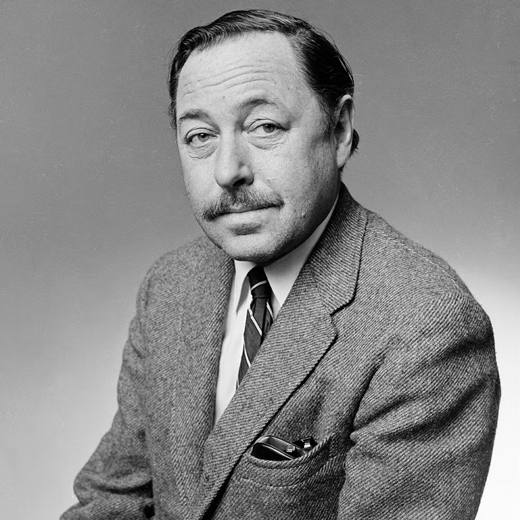
Portrait of Tennessee Willaims by Jack Mitchell
Tennesee Willaims was a Pulitzer Prize-winning American playwright and poet who is widely regarded as one of the best of our time. His deeply sophisticated and oftentimes lyrical plays have garnered the attention of critics and audience alike for years. Tennessee’s most notable plays are A Streetcar Named Desire, Cat on a Hot Tin Roof, and The Glass Menagerie. Williams was born Thomas Lanier Williams III on March 26, 1911, in Columbus, Mississippi. He was mostly raised by his mother Edwina Williams. Williams had a difficult and complicated relationship with his father, Cornelius Coffin Williams, who was a traveling shoe salesman and alcoholic. His maternal grandfather was an Episcopal priest and the family lived for part of his childhood with his maternal grandparents in the Episcopal rectory.
When Williams was high school age, his family moved to St. Louis, Missouri for his father’s work, where Williams attended Soldan High School and University City High School. In college, Williams took journalism classes at the University of Missouri, and started writing poems, essays, stories, and plays for writing competitions. In his junior year, he left college and went to work at the International Shoe Company where his father worked. He worked all day and wrote in the evenings and weekends, and eventually had a nervous breakdown. When he was well enough to return to his studies, he attended Washington University in St. Louis, MO, and then the University of Iowa in Iowa City, where he finally received his BA in English in 1938. He then moved to New York City, and studied at The New School and became involved in the theater. Around that time, he adopted the pen name Tennessee Williams.
Williams was relatively unknown until his play The Glass Menagerie was performed in New York City in 1944. It was successful with critics and audience alike, and was followed by successful productions of several more of his plays – A Streetcar Named Desire, Cat on a Hot Tin Roof, Sweet Bird of Youth, and The Night of the Iguana. Williams initially had several relationships with women, and then in his late 20s became interested in men. He had several partners, and in the late 1940s fell in love with Frank Merlo, who was his partner for several years until Merlo died of lung cancer in 1963. Williams suffered from personal difficulties later in life, including alcoholism and drug addiction, debilitating depression after the death of his partner Merlo, and distress over several productions that were box office failures. His sister, Rose Williams, also struggled with mental illness, and spent many years in mental institutions. Williams died alone at 71 years of age of an overdose of barbiturates that had been prescribed as a sleeping aid.
Spring Storm was one of Williams’ earliest plays, and was not well received when he presented it to his university class at the time. It is still not as well known as many of his other works and wasn’t produced after his death. It tackles themes of sexism, class, female autonomy, and to a lesser degree racism that was prevalent at the time. Characters in Spring Storm form the basis of characters in his more famous plays, such as Blanche Dubois in A Streetcar Named Desire and Alma Winemiller in Summer and Smoke.
Sources:
“Tennessee Williams: Mad Pilgrimage of the Flesh” by John Lahr
“Tom: The Unknown Tennessee Williams” by Lyle Leverich
Page 11 of 12